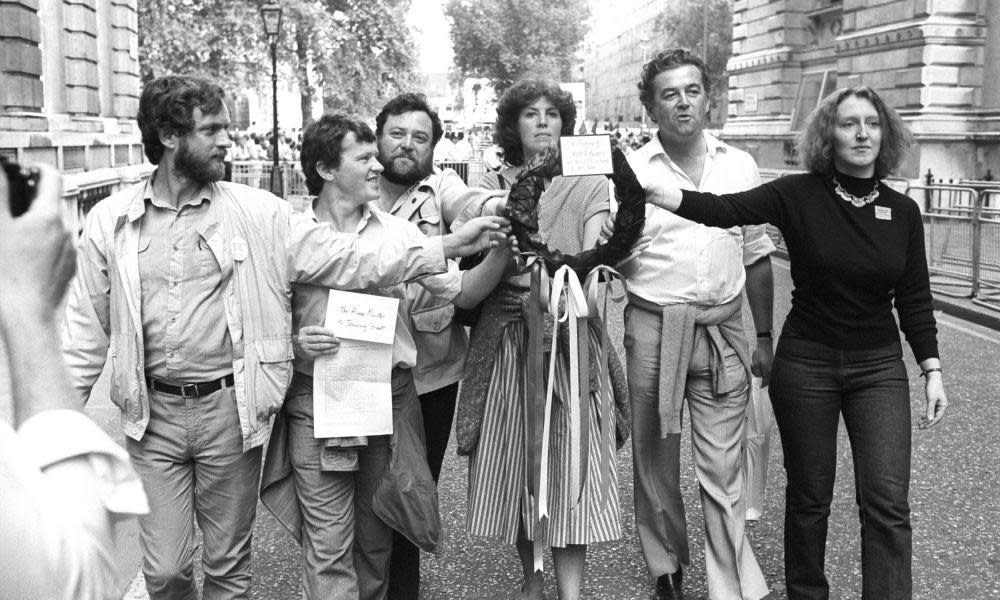Jeremy Corbyn plans to speak to families of IRA Hyde Park bombing victims

Jeremy Corbyn would like to speak to the families of victims killed in the IRA Hyde Park bombing, the Guardian has learned, as accusations surrounding the Labour leader’s past links to the organisation continue to dog the party.
Relatives of the four soldiers killed in the IRA attack in July 1982 are engaged in a fundraising campaign to finance a legal action against the only suspect connected to the bombing, John Downey.
The loved ones of those killed in the explosion had complained they did not receive a reply to a letter they sent to the Labour leader last month.
But it is understood that Corbyn is interested in learning more about the campaign, speaking to the families and supporting them in their efforts to access the justice system.
A Labour spokeswoman said: “Jeremy is committed to seeing truth and justice for all victims of Northern Ireland’s violent and tragic past and believes the best way to achieve this is to see the full implementation of the Stormont House agreement legacy bodies.
“Labour is determined to tackle barriers to the legal system, ensuring that everyone has access to justice.”
The Hyde Park Justice Campaign issued a letter on Monday calling on the Labour leader to take a stand against the outgoing government’s decision not to fund their civil action against Downey.
Mark Tipper, whose 19-year-old brother Simon was one of the four soldiers killed, said he wrote to Corbyn a month ago seeking his help.
In his letter Tipper writes: “More than 20 MPs and Lords from all parties, including your own, turned out at a meeting in parliament to show their support for our cause. Why do they speak out when you will not?”
Referring to recently raised allegations that Corbyn supported the IRA campaign during the Troubles – a charge the Labour leader rebuffs – Tipper said: “Despite the series of reports over the years containing allegations about your support for the IRA, we hoped it could not be true that a leader of the opposition in this country, who could one day be prime minister, would possibly support terrorists and the murder of innocent men, women and children.
“Therefore, we still believed you might do the right thing and discharge your duty and stand up to the government in its failure to bring Downey to trial.”
Downey was originally charged with the murders of trooper Simon Tipper, L/Cpl Jeffrey Young, Cpl Roy Bright and Lt Anthony Daly when a bomb packed with nails exploded as the Blues and Royals soldiers rode to the changing of the guard ceremony in Hyde Park on 20 July 1982.
Downey had been arrested at Gatwick airport in 2013 on his way to a sailing holiday in Greece. The case against him was based on fingerprint evidence from car-park tickets found near Hyde Park. But the case collapsed a year later when Downey’s legal team produced a so-called ‘on the run’/‘get out of jail’ card which the court believed gave the Donegal man an amnesty for past crimes connected to the Troubles.
The so-called ‘on the run’ letters to 187 IRA suspects, many of whom were wanted for atrocities such as the Poppy Day massacre of 1987 in Enniskillen, were granted by Tony Blair’s government as a means of winning Sinn Féin support for devolution and new policing structures in Northern Ireland.
It later transpired that the ‘on the run’ letters actually had no legal foundation and that the Police Service of Northern Ireland had to apologise for mistakenly sending the letter to Downey, creating the false impression that it was legally binding.
In response to the collapse of the criminal trial the victims’ families have launched the campaign to finance a civil action against Downey. They are raising cash via their website and through the Sun newspaper.
Their campaign is modelled on the success of the Omagh bomb civil action, in which relatives of the 29 people killed in the 1998 Real IRA massacre sued a number of men in a Belfast court who they said were behind the plot.
In a landmark 2013 ruling, two men, Colm Murphy and Seamus Daly, were found responsible for the atrocity. A criminal case against Daly in connection to Omagh however was dropped last year by Northern Ireland’s public prosecution service.
Earlier, the Northern Ireland secretary, James Brokenshire, challenged Corbyn to condemn the IRA after claiming the Labour leader failed to do so in an interview with Sky News on Sunday. Brokenshire’s comments were passed on by a reporter from the Sun during the launch of Labour’s arts manifesto in Hull.
Asked whether he condemned the IRA as terrorists, Corbyn said: “I condemn all acts of violence in Northern Ireland wherever they came. I spent the whole of the 1980s representing constituencies with large numbers of Irish people in them. We wanted peace, we wanted justice, we wanted a solution. The first ceasefire helped to bring that about those talks which represented all sections of the community of Northern Ireland.
“The Labour government of 1997 helped bring in the historic Good Friday agreement the basis of which was a recognition of the differing cultural histories and values of Northern Ireland. It stood the test of time and it’s still there. We have a devolved administration. We should recognise that that peace was achieved by a lot of bravery both in the unionist and in the nationalist community.”

 Yahoo News
Yahoo News 
